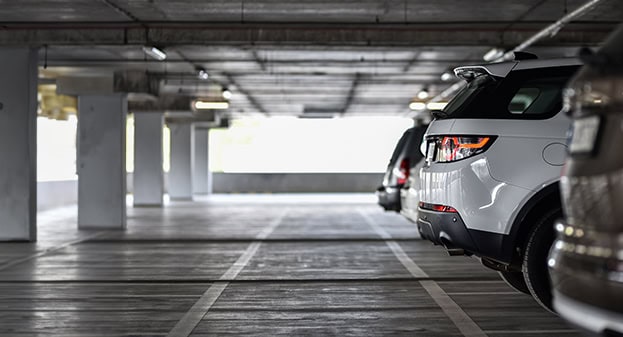From water leakage to exposed rebar, these key indicators signal potential structural risks and safety hazards. Don’t wait for costly damage to escalate, know the signs and to safeguard your parking structure.
Water Leakage or Ponding Water
Water and elemental exposure can be detrimental to reinforced concrete structures. Any signs of standing water or water leaking in a parking garage, should be addressed quickly. Water causes corrosion to the reinforcement steel in the concrete which eventually compromises the integrity of the structure. If no water is visible but rust stains and efflorescence are present, this is an indicator that water is penetrating the concrete structure. A full evaluation should be done by a waterproofing professional to determine a mitigation plan. For ponding water, a waterproof, vehicular traffic rated drain installation, filling of the low spot with specialty binders and mortars, or protective waterproofing membrane can help prevent future problems. The longer maintenance of these areas is deferred, the greater the chance of more severe structural damage and costly repairs.
Expansion Joint Failure
Expansion joints serve an important role in the stability and longevity of a parking structure. Expansion joints allow the parking deck to move while keeping water from leaking into lower levels and internal structural steel components. If the joints of your parking garage are cracking, leaking, or experiencing failure of any kind: timely repair or replacement is essential to prevent costly damage in the future.
Concrete Cracks
Cracks can and do happen occur in concrete to a variety of reasons. When cracks form, they invite moisture and other fluids and de-icing chemicals to infiltrate, causing corrosion and potential structural issues over time. When water reaches the reinforcement, PT cables, and embedded steel connections, the corrosion process begins. Continuous corrosion over time can lead to structural damage. Addressing any cracks with a regular maintenance plan can aid in extending the life of the structure.
Spalling Concrete
Concrete is reinforced with steel to add structural stability and increase flexural strength. Spalling concrete can pose serious safety risks, including falling debris, trip hazards and potential structural weakening of the structure over time. Due to the porosity of concrete, water causes the structural steel to corrode and expand. This corrosion and expansion create tension on the surrounding concrete causing it to spall and fail, which can lead to serious structural and life safety concerns. When concrete spalling is not properly addressed, it is not uncommon for concrete to fall on cars and pedestrians, injuring anyone traveling through the parking structure.
Exposed Rebar
An extensive amount of spalling or corrosion can be identified by exposed rebar or rust stains on the concrete from oxidizing steel. If either rust stains or rebar are visible, it should be addressed immediately, as these could be signs of a more serious issue. If rebar lacks adequate concrete coverage it can be a safety hazard to car tires and pedestrians as well as increase the rate of deterioration of the structural integrity of the building.
DCPS: Your Partner in Parking Garage Repairs
Maintaining the structural integrity of your parking garage is paramount to avoid costly repairs and ensure safety for users. Addressing issues such as water leakage, expansion joint failure, concrete cracks, spalling concrete, and exposed rebar promptly through professional evaluation and mitigation plans is crucial. Ignoring these signs can lead to severe structural damage and safety hazards. If you see any signs of deterioration or water infiltration in your parking garage, give DCPS a call at 720-575-3277 for a free walk-through and estimate to safeguard your parking garage and extend its lifespan.

